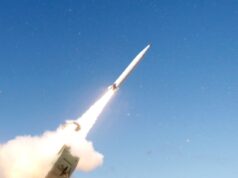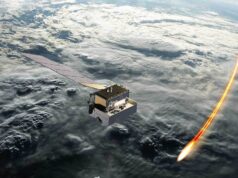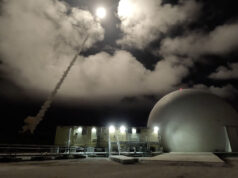The US Federal Aviation Administration has granted Boeing’s KC-46 tanker program a Supplemental Type Certificate, verifying that its refuelling and mission avionics systems meet FAA requirements.
The milestone marks completion of KC-46 FAA certification say Boeing in a release.
To receive its STC, Boeing’s team completed a series of lab, ground and flight tests, which commenced in 2015. As part of the required flight testing, the team validated the KC-46’s boom and drogue aerial refuelling systems met FAA certification criteria.
“Our Boeing/Air Force test team did an outstanding job successfully leading us through all the requirements, and we appreciate the FAA’s collaboration as well,” said Mike Gibbons, Boeing KC-46A tanker vice president and program manager.
“This milestone is important in that it is one of the last major hurdles in advance of first delivery to the U.S. Air Force.”
The STC is one of two required FAA airworthiness certifications. Boeing received an Amended Type Certificate for its core 767-2C aircraft configuration in December 2017. While those certifications cover most of the jet, not all military functions and equipment can be certified by the FAA.
According to the company:
“Six aircraft have supported various segments of STC and MTC testing. Overall they have completed 3,500 flight hours and offloaded more than three million pounds of fuel during refuelling flights with F-16, F/A-18, AV-8B, C-17, A-10, KC-10, KC-135 and KC-46 aircraft. The KC-46, derived from Boeing’s commercial 767 airframe, is built in the company’s Everett, Wash., facility. Boeing is currently on contract for the first 34 of an expected 179 tankers for the U.S. Air Force.
When in service, the multi-role KC-46 will refuel U.S., allied and coalition military aircraft using its boom and hose and drogue systems, but also must be able to take on fuel to extend its operational range. The boom allows the tanker to transfer up to 1,200 gallons of fuel per minute, while the hose and drogue systems, located on both the plane’s wing and centre line, enables the KC-46 to refuel smaller aircraft with up to 400 gallons of fuel per minute.”
According to the company, the U.S. Air Force also must grant a Military Type Certificate (MTC), which is expected in the coming months. Boeing’s team concluded MTC flight testing, which included the jet’s aerial refuelling, defensive and other military-specific systems, in early July.










A fine example of pork barrel procurment- late, over budget and beset with problems
That’s what my grandmother would call putting your best foot forward. My heart always sank when I was booked to fly on the cramped 767. Happy for Boeing they found a use for it.
Should have gone with the Airbus option far superior.
USAF has got itself a flying pork barrel , poor value for money for the airforce, poor use of tax $$$ .
(Chris H)
Dear Mr Boeing
Given all refuelling systems have now been approved will you kindly pay Cobham all their outstanding invoices for work and systems provided to date that you have sat on to make your accounts on this programme look better? This totally unjustified and vicious action placed Cobham under considerable and damaging market pressure.
The failures in this programme are entirely Boeing failures and no one else’s given you took an old aircraft and just raided various spare parts bins. After all Cobham systems have been used on aircraft with no difficulty since Sir Alan Cobham founded Flight Refuelling Ltd in 1934. Wasn’t it his equipment that allowed your B-29s to establish long distance world records in the post WWII era? Indeed the best example of its modern air refuelling systems being found in the superb A330 MRTT. 14 examples of which were ordered by the UK RAF in 2008 the same year you bought your KC-46 contract via useful idiots in the US Senate who reduced the specific requirements from 800 (that the A330 met in full) to the 370 that you only managed to meet.
All RAF A330s have been delivered and all worked ‘right out of the box’. Complete with Cobham refuelling systems. You failed to meet the first delivery dates for 18 aircraft in August 2017, you failed again in August 2018 and everyone know you will never deliver 18 fully operational KC-46 aircraft in a year’s time. I agree with Bank of America/Merrill Lynch who noted back in 2015:
“We fail to understand how Boeing could take a $1.26 billion pre-tax charge on the Boeing KC-46A program since the program is based on the 767 airframe that has been in production for over 30 years.”
Only in America and please excuse my Schadenfeude
Yours sincerely
A UK Taxpayer
(Chris H)
For background information
https://www.thetimes.co.uk/article/cobham-takes-dive-amid-boeing-dispute-x66l836qt
Yet another example of many of why we should be very very careful in all our engagements with US Incorporated. Especially over Tempest.
It’s funny reading all the willy waving and sycophantic clap trap that’s being written on Linkedin regarding Boeing’s marvellous effort of securing and building the KC46 tanker (mostly by Boeing employees I might add). I am sure that the aircraft will be a successful tanker, but how’d did it come to this. Basically Team USA said no to the Airbus proposition because it wasn’t American, ok Lockheed Martin were involved, but only yo get around the issue of the aircraft must be built in the US. So what it boils down to is they can sell to us but not in return – does “quid pro quo” mean anything apparently not to Boeing!